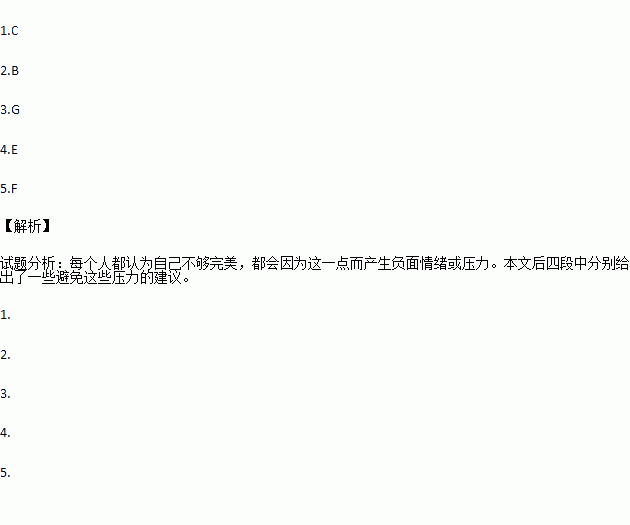题目内容
根据短文内容,从短文后的选项中选出能填入空白处的最佳选项。选项中有两项为多余选项。
We all go through times when we feel we are not good enough. We might feel that way at work or in school or even as a parent. Here are some things to remember when you feel like that.
1..When I started my Ph.D. program, I felt like the dumbest person in every class. I couldn’t believe how many smart people were there. I didn’t know if I could measure up to their intelligence or compete in the same league with them. Years later, I found out that almost everyone felt this way, too.
You are unique and have special talents. If you can barely make Hamburger Helper , don’t compare yourself to your sister who is a chef(厨师). I’m sure you can do many things that she can’t. 2. You are you. You are not your sister.
You need to stop chasing perfection. It doesn’t exist. What’s perfect to me is not perfect to you. So if you think that there is some objective measurement of perfection and that the rest of the world is judging you against, then you are wrong. 3..
4..Our sense of self-worth is based in our thoughts. We have been programmed for many years with thoughts about ourselves. Messages come from our parents, our peers, teachers, the media and our own labels. But guess what? They are only thoughts. Just because you think these thoughts, it doesn’t make them true. 5..
A. You have the power to change your future.
B. So focus on your own passions and talents.
C. You are not the only one who feels this way.
D. If you love yourself for who you are, other people will notice.
E. You need to change your thought patterns.
F. One of my favorite sayings is, “Don’t believe a negative thought you think!”
G. Most people are too worried about their own lack of perfection to judge you.
 阅读快车系列答案
阅读快车系列答案

 ),并在其下面写出该加的词。
),并在其下面写出该加的词。